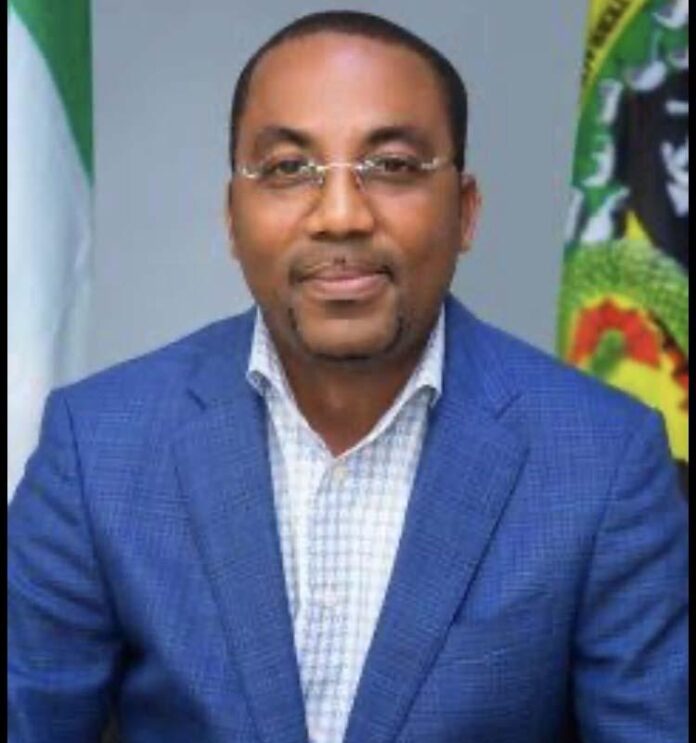The Managing Director, Nigerian Port Authority (NPA), Mr. Mohammed Bello-Koko has allayed fears on the operations of Lekki Deep Seaport, Lagos.
Apart from the attendant traffic jam, not a few have expressed fears that the commencement of operation at Lekki Deep Seaport may lead to the death of other seaports situated in Lagos.
These include Africa’s largest container terminal situated in the Lagos Port Complex (LPC) and Tin Can Island Port (TCIP).
Bello-Koko stated this recently at the League of Maritime Editors (LOME) 2022 annual retreat and awards with the theme: “Lekki Deep Seaport: Identifying Gains, Challenges and Potential Threat to Lagos Ports.”
Bello-Koko who was represented by NPA Assistant General Manger Operations, Mr. Ayodele Durowaye stated that there seem to be this morbid fear by stakeholders that the emergence of Lekki port may signal the death of LPC and TCIP and perhaps may become tourist locations.
The NPA helmsman however maintained that there was no truth whatsoever in the fears expressed by some stakeholders in the maritime industry.
His words: “This is simply not true. There is no doubt that operationalization of Lekki port would be a game changer not only for NPA operation but for the national economy at large, it is therefore important that necessary infrastructure deficit be put in place to optimize the benefits and guarantee the positive impacts.
“It may be necessary for NPA management to create requisite synergy with relevant bodies towards addressing observable operational constraints. It would equally be necessary to engage in advocacy to sensitize various stakeholders in their respective roles in actualizing the provisions of these critical infrastructures”.
Also speaking, the Comptroller General of Customs (CGC), Nigerian Customs Service (NCS), Colonel Hameed Ali (retired) said that the service is ready to partner with other critical stakeholders in the value chain to ensure that the port serves its purpose.
Ali who was represented by Assistant Comptroller General (ACG), Zonal Coordinator, Zone ‘A’ Adeyanju Aremu said that the theme was very apt and coming at a most auspicious moment when it has become necessary to decongest the existing ports.
According to him, it is a general knowledge that the seaport upon completion is expected to be the biggest seaport in Nigeria and a major step towards Africa’s largest economy, breaking through a bottleneck in the international and achieving accelerated economic growth. As the first deep seaport in Nigeria, it has capacity to handle 1.2 million containers annually, thereby potentially increasing the country’s container handling capacity by 80 percent.
Continuing, he said: “Additionally, the port would position Lagos as a new maritime logistics hub in West Africa while also helping Nigeria to attain full economic leadership in the African Continental Free Trade Area Agreement.
“The NCS believes that the gains far out ways the demerits of the facility and that underscore the immediate creation of a custom command with all the paraphernalia to ensure that pioneering operations are seamless. We are ready to partner with other critical stakeholders in the value chain to ensure that the facility serves its purpose of establishment.
In her remarks, the Chairman, Seaport Terminal Operators Association of Nigeria (STOAN) Princess Victoria Haastrup said that the increasing population of Nigeria requires new and more port.
Haastrup who was also represented by the Spokesperson of STOAN, Dr. Bolaji Akinola, said that the lekki port is not a threat to any of the existing ports in the country.
Her words: “As population grows port too must expand, so there is room for new port development in Nigeria, It is not a competition. They would complement each other. What Apapa and Tin Can cannot do Lekki would do. The Nigeria’s economy pulled the most in 2014 that was when they had the highest cargo throughput in Nigeria. That means our port handled two million Twenty Equivalent Units (TEUs) in 2014. It is the highest in the history of this country and since then the port has not handled that capacity. It is not because they cannot but because the volume is not there. Oil price and COVID had impact on freight. In 2021 it was about 1.6 million TEUs. We have not been able to handle two million TEUs after 2014.”











